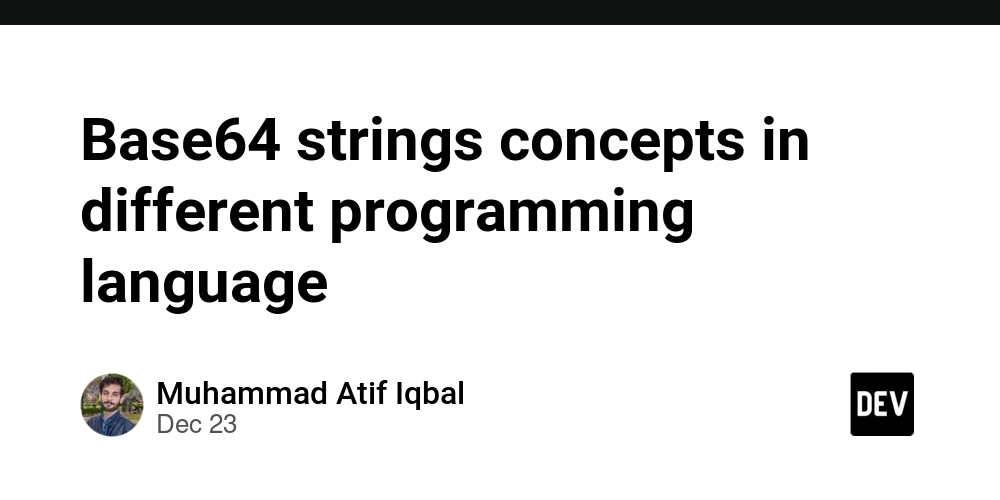Base64 strings are not unique to Python; they are widely used in many programming languages and platforms. Base64 encoding is a universal standard defined in RFC 4648almost all major programming languages provide built-in or library support for processing Base64 strings.
Language and usage
The following is the support and use of Base64 in various popular languages:
1. Python
-
module:
base64 - Use cases: Encoding and decoding binary data, specifically for APIs, file uploads, and embedding resources in HTML/JSON.
import base64
# Encode
encoded = base64.b64encode(b"Hello, Python!")
print(encoded) # Output: b'SGVsbG8sIFB5dGhvbiE='
# Decode
decoded = base64.b64decode(encoded)
print(decoded) # Output: b'Hello, Python!'
2. JavaScript
-
method:
btoa(binary to ASCII),atob(ASCII to binary) - Use cases: Encode network communication data and embed images or files in web pages.
// Encode
let data = "Hello, JavaScript!";
let encoded = btoa(data);
console.log(encoded); // Output: "SGVsbG8sIEphdmFTY3JpcHQh"
// Decode
let decoded = atob(encoded);
console.log(decoded); // Output: "Hello, JavaScript!"
3. Java
-
library:
java.util.Base64 - Use cases: Secure file handling, API integration, and token management.
import java.util.Base64;
public class Main {
public static void main(String[] args) {
// Encode
String original = "Hello, Java!";
String encoded = Base64.getEncoder().encodeToString(original.getBytes());
System.out.println(encoded); // Output: "SGVsbG8sIEphdmEh"
// Decode
byte[] decodedBytes = Base64.getDecoder().decode(encoded);
String decoded = new String(decodedBytes);
System.out.println(decoded); // Output: "Hello, Java!"
}
}
4. C#
-
namespace:
System.Convert - Use cases: File handling, security token exchange, and embedding data in Web APIs.
using System;
class Program {
static void Main() {
// Encode
string data = "Hello, C#!";
string encoded = Convert.ToBase64String(System.Text.Encoding.UTF8.GetBytes(data));
Console.WriteLine(encoded); // Output: "SGVsbG8sIEMjIQ=="
// Decode
string decoded = System.Text.Encoding.UTF8.GetString(Convert.FromBase64String(encoded));
Console.WriteLine(decoded); // Output: "Hello, C#!"
}
}
5. PHP
-
Function:
base64_encodeandbase64_decode - Use cases: Handles image uploads and encodes user credentials (such as basic authentication).
// Encode
$data = "Hello, PHP!";
$encoded = base64_encode($data);
echo $encoded; // Output: "SGVsbG8sIFBIUCE="
// Decode
$decoded = base64_decode($encoded);
echo $decoded; // Output: "Hello, PHP!"
?>
6. ruby
-
library:
Base64(Part of the Ruby standard library) - Use cases: API coding, processing files, embedding binary data in text.
require 'base64'
# Encode
data = "Hello, Ruby!"
encoded = Base64.encode64(data)
puts encoded # Output: "SGVsbG8sIFJ1Ynkh\n"
# Decode
decoded = Base64.decode64(encoded)
puts decoded # Output: "Hello, Ruby!"
7. go
-
pack:
encoding/base64 - Use cases: Token management, secure file transfer, and embedding data in APIs.
package main
import (
"encoding/base64"
"fmt"
)
func main() {
// Encode
data := "Hello, Go!"
encoded := base64.StdEncoding.EncodeToString([]byte(data))
fmt.Println(encoded) // Output: "SGVsbG8sIEdvIQ=="
// Decode
decoded, _ := base64.StdEncoding.DecodeString(encoded)
fmt.Println(string(decoded)) // Output: "Hello, Go!"
}
Common apps across languages
-
Network API:
- Encode binaries (e.g. images, audio) for transmission via REST or GraphQL APIs.
- Commonly used in authentication tokens (for example, JSON web tokens use Base64).
-
Embed data:
- Embed resources in HTML (such as inline images)
Label).
- Embed resources in HTML (such as inline images)
-
Email attachment:
- Base64 is used to encode binary files in MIME email attachments.
-
File processing:
- Convert files to Base64 strings for storage in text-based databases.
